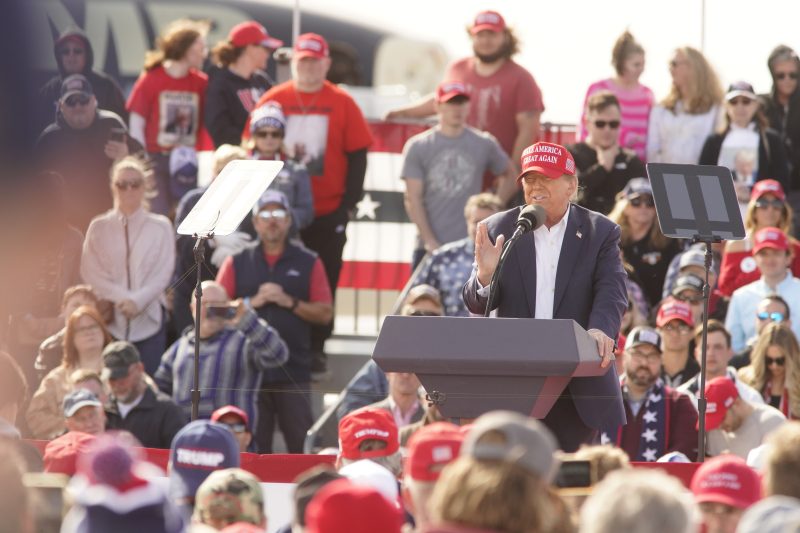March 19, 2024
Unraveling the Matrix: Decoding Trump’s First Impeachment
 Trump’s Mixed-Up Account of His First Impeachment: A Detail Analysis
The first impeachment of former President Donald Trump in 2019 was a significant event in American political history, marked by a series of controversies and turmoil. In the aftermath of the impeachment, Trump has repeatedly offered a mixed-up, invented, and false account of the events leading to his impeachment, attempting to shape the narrative in his favor. A closer examination of Trump's claims reveals a deliberate effort to mislead and distort the facts surrounding this historic episode.
One of the key falsehoods perpetuated by Trump is his assertion that the impeachment was a partisan witch hunt orchestrated by Democrats. While it is true that Democrats held a majority in the House of Representatives at the time, it is essential to note that the articles of impeachment were based on specific allegations of abuse of power and obstruction of Congress. The impeachment inquiry was conducted following a whistleblower complaint alleging that Trump had sought foreign interference in the 2020 election by pressuring Ukraine to investigate his political rival, Joe Biden. The subsequent impeachment proceedings were a constitutional response to these serious allegations, rather than a partisan attack.
Trump has also sought to downplay the significance of his actions by framing them as routine diplomatic efforts. He has claimed that his now-infamous phone call with Ukrainian President Volodymyr Zelensky was a perfect call and that he was merely seeking to address corruption in Ukraine. However, the evidence presented during the impeachment inquiry painted a starkly different picture, revealing a concerted effort by Trump and his associates to leverage U.S. military aid to pressure Ukraine into investigating Biden. The call transcript and testimony from multiple witnesses corroborated these allegations, exposing Trump's actions as an abuse of power for personal gain.
Furthermore, Trump has falsely claimed that he was acquitted in the impeachment trial, suggesting that he was exonerated of any wrongdoing. While it is true that the Republican-controlled Senate ultimately voted to acquit him of the charges brought forth by the House, it is crucial to recognize that the acquittal was not a vindication of Trump's actions. Senate Republicans' decision to acquit was largely along party lines, with only a few breaking ranks to vote for conviction. The acquittal does not erase the evidence presented during the trial nor absolve Trump of his breach of public trust.
In conclusion, Trump's mixed-up, invented, and false account of his first impeachment serves as a reminder of his penchant for distorting the truth to suit his agenda. By mischaracterizing the impeachment as a partisan attack, downplaying the seriousness of his actions, and falsely claiming exoneration, Trump seeks to rewrite history in his favor. However, a careful examination of the facts reveals the true nature of his conduct and the constitutional significance of the impeachment process. Trump's legacy will forever be marked by this stain on his presidency, a testament to the enduring importance of accountability and transparency in governance.
Trump’s Mixed-Up Account of His First Impeachment: A Detail Analysis
The first impeachment of former President Donald Trump in 2019 was a significant event in American political history, marked by a series of controversies and turmoil. In the aftermath of the impeachment, Trump has repeatedly offered a mixed-up, invented, and false account of the events leading to his impeachment, attempting to shape the narrative in his favor. A closer examination of Trump's claims reveals a deliberate effort to mislead and distort the facts surrounding this historic episode.
One of the key falsehoods perpetuated by Trump is his assertion that the impeachment was a partisan witch hunt orchestrated by Democrats. While it is true that Democrats held a majority in the House of Representatives at the time, it is essential to note that the articles of impeachment were based on specific allegations of abuse of power and obstruction of Congress. The impeachment inquiry was conducted following a whistleblower complaint alleging that Trump had sought foreign interference in the 2020 election by pressuring Ukraine to investigate his political rival, Joe Biden. The subsequent impeachment proceedings were a constitutional response to these serious allegations, rather than a partisan attack.
Trump has also sought to downplay the significance of his actions by framing them as routine diplomatic efforts. He has claimed that his now-infamous phone call with Ukrainian President Volodymyr Zelensky was a perfect call and that he was merely seeking to address corruption in Ukraine. However, the evidence presented during the impeachment inquiry painted a starkly different picture, revealing a concerted effort by Trump and his associates to leverage U.S. military aid to pressure Ukraine into investigating Biden. The call transcript and testimony from multiple witnesses corroborated these allegations, exposing Trump's actions as an abuse of power for personal gain.
Furthermore, Trump has falsely claimed that he was acquitted in the impeachment trial, suggesting that he was exonerated of any wrongdoing. While it is true that the Republican-controlled Senate ultimately voted to acquit him of the charges brought forth by the House, it is crucial to recognize that the acquittal was not a vindication of Trump's actions. Senate Republicans' decision to acquit was largely along party lines, with only a few breaking ranks to vote for conviction. The acquittal does not erase the evidence presented during the trial nor absolve Trump of his breach of public trust.
In conclusion, Trump's mixed-up, invented, and false account of his first impeachment serves as a reminder of his penchant for distorting the truth to suit his agenda. By mischaracterizing the impeachment as a partisan attack, downplaying the seriousness of his actions, and falsely claiming exoneration, Trump seeks to rewrite history in his favor. However, a careful examination of the facts reveals the true nature of his conduct and the constitutional significance of the impeachment process. Trump's legacy will forever be marked by this stain on his presidency, a testament to the enduring importance of accountability and transparency in governance.
If you would like to delve into the world of investment topics , go to our partner project Wall Street Wizardry


